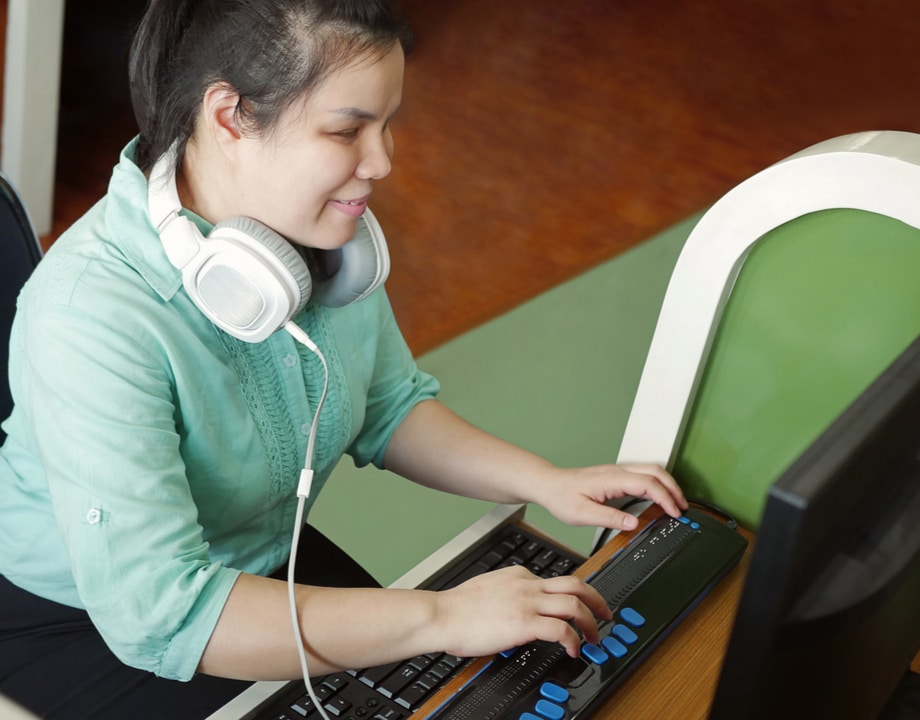Recruitment Blog
Addressing the employment gap for people with disability: Randstad and Get Skilled Access team up

Randstad and Get Skilled Access are conducting a pilot program to revolutionise how Australian companies and recruitment agencies recruit people with disabilities.
The RecruitAble program aims to “reduce the employment gap for people with disability by changing attitudes to hiring people with disability and making the process easier and inclusive for all through mainstream recruitment providers.”
Currently, approximately 4.5 million people across Australia have a disability, but only 53% participate in the workforce. That’s a vast talent pool underutilised and overlooked due to prejudice and ignorance.
Underestimating these quality candidates will hurt their employment prospects, but it’ll also hurt your business. According to 2020 Accenture research, organisations focused on disability engagement grow their sales 2.9x faster and profits 4.1x faster than their competition.
So, as talent acquisition professionals and recruiters, what can you do to improve your recruitment practices, make them more accessible and inclusive, and hire people with disabilities?
We spoke to Kerry McQuillan, Randstad’s Queensland State Director and its National Diversity and Inclusion Lead, about how the program was developed and what it means for recruiters and in-house HR teams.
In partnership with Dylan Alcott’s organisation Get Skilled Access, Randstad is conducting the RecruitAble pilot, aiming to reduce the employment gap for people with disability in Australia. What prompted Randstad to work alongside Get Skilled Access on this initiative?
Kerry: Randstad and Get Skilled Access have been working in partnership for about four years now. When Randstad wanted to set up our diversity and inclusion practices, we were looking for a partner that had expertise and lived experience in disability. We settled on Get Skilled Access because it isn’t a company just making decisions for people with a disability; this is an organisation run by people with disabilities. Get Skilled Acess and Randstad have a lot of the same values and a lot of shared goals that we want to achieve.
Over the last four years, we have talked a lot about how mainstream recruitment companies like Randstad can change the way the employment market looks at people with disabilities and what we can do better. So it made a lot of sense for Randstad and Get Skilled Access to continue our partnership and create a pilot program to change the way mainstream recruitment companies work to make disability employment more inclusive. We both bring unique value to the partnership in that we’re the experts in the recruitment space, and they’re the experts in working with organisations and making them disability confident, training them, and making them more disability-inclusive.
How does the RecruitAble pilot work?
Kerry: Through the RecruitAble pilot program, we’re trying to create a way for mainstream recruitment companies to better support people with disabilities through the hiring process. The unemployment rate for people with disabilities hasn’t shifted over the past few years so this is an untapped candidate market that we can support and help.
When we were putting together this pilot, we had a discovery phase, where we spoke to other recruitment agencies, candidates with disabilities and organisations, wanting to learn about their individual experiences in the recruitment process. We wanted to find out what barriers these candidates felt that they were coming up against from a mainstream recruitment company – and then of course, the pilot aims to provide candidates with a more accessible alternative so that candidates feel that they can come to a recruitment agency and have an inclusive and supportive experience.
So, there’s a three-pronged approach to the pilot: supporting the candidates, supporting the recruiters, and then supporting the organisations. At the end of the pilot program, we’re hoping that we have a blueprint that says here are some things that work well and some things that don’t.
We want to open up that candidate pool and for people to feel that if they come to a recruitment agency that they’ll be supported, have an inclusive recruitment process, and will be treated fairly. In other words, if they’re suitable for the job, they should get the job.
We want to help our recruiters feel confident when approaching inclusive conversations. When we’re placing people into organisations, we want it to work so there’s a career opportunity for them. The organisation understands any needs or supports they might have without putting people into a situation where they feel unhappy.
What are the current roadblocks and challenges that disabled jobseekers face when seeking employment? And how can recruitment agencies and in-house talent acquisition teams address these issues?
Kerry: I don’t have a disability, so I don’t think it’s right for me to give some sweeping statements of what people should do and what they shouldn’t do. During the pilot’s discovery phase, the feedback that we’ve received from candidates with disabilities is that it’s the simple things that can make the biggest difference. Some quick minor tweaks and changes can have a big impact on people feeling that they will have an accessible and inclusive recruitment process.
For example, the way that job ads are written can be examined. One consideration is the use of plain English so that people with learning difficulties better understand the job requirements and descriptions. Sometimes we can put a lot of jargon into job ads or use words that people can take as a literal meaning. Our RecruitAble webpage has documents for candidates to go through, which explore how to write a resume and interview techniques. We have a version of these documents available in plain English for this reason.
As a job seeker, if you’re having trouble understanding a job ad, and what that company requires, why would you apply to that organisation? So that’s what this pilot is trying to do, remove that barrier. Get Skilled Access is the expert in evaluating that, which is why we have partnered with the organisation. We have people with disabilities reviewing the recruitment process in order to improve it for other people with disabilities.
How long will the RecruitAble pilot go for?
Kerry: The RecruitAble pilot program will run for two years. We’ve been running the pilot for six months now and during this time we’ve been working with some of the participating organisations, as well as internally as Randstad is one of the organisations taking part in the pilot. This means that alongside the recruiting, we have also gone through a complete recruitment analysis of how we do things, our policies, our website, how people apply for jobs, and other elements. Our executive team and middle managers have gone through training, and we’re rolling out the training throughout our organisation over the coming weeks. At this point, we probably have another year and a half to complete the initial process.
We’re running phases of recruiting for other organisations during this pilot, like Bendigo Bank, RACQ, Coles, Tennis Australia, and Hydro Tasmania. They’re all at different stages of this process. Some are ready for the training, others are still looking at their recruitment processes, and some are ready to start recruiting.
With the findings of this pilot informing the National Disability Employment Strategy, which will be a crucial component of the Federal Government’s National Disability Strategy, what do you hope to achieve from this pilot?
Kerry: By the end of the pilot program, we want to have developed a blueprint detailing what we need to do to make mainstream recruitment accessible for people with disability.
The fact that La Trobe University is externally evaluating us is fundamental. La Trobe is involved in the whole process from start to finish. By the end of the pilot program, we will have a report that will tell us what works and what doesn’t.
When we get to the end of this, I’m hoping we have something that we can go to the recruitment industry and say, “here is a blueprint of a way for this to work.”
I would like to get more recruitment agencies involved. The next stage is having five or six other recruitment agencies running through a similar process. At the end of that, we’ve got a group of us ready to work with this untapped talent pool and find people jobs. I would love for candidates to look at Randstad and see us as an organisation that they could come to when they’re looking for work.
I want people to feel that they have access to inclusive recruitment processes and that they have a chance to find a job they want in a career field they want to be in and have the opportunity to demonstrate their skills.
The end goal is for this pilot program to roll out and place people into fulfilling jobs and promising careers. Candidates should feel that they have meaningful employment, and have had a fair go when applying for jobs. That will be great to see.
Find out more about the RecruitAble pilot here.
Related blog posts

Lack of diversity in the workplace has become an increasingly prominent issue in the tech industry and it’s particularly apparent …
Ready to get started?
Talk to one of our friendly team members


